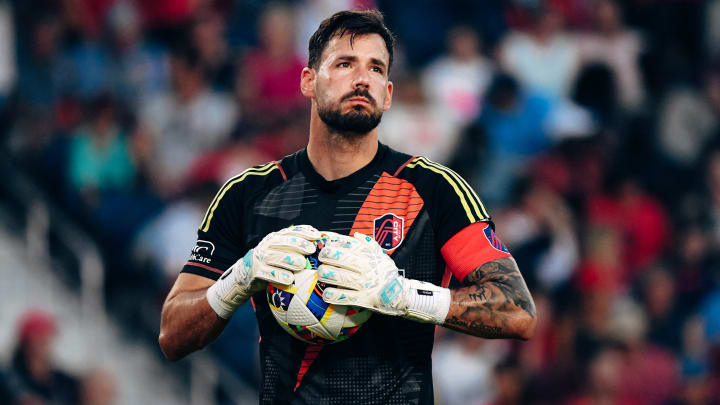
Talk to Someone (Anyone)
Talk to someone.
Do it.
I don’t care who you are, or whether you think you have any issues. You feel fine? Hey, try it anyway. Find a therapist, a parent, or maybe a friend.
For me, it has saved me more times than I can remember.
Forgive me for getting a little personal here. When you see a goalkeeper, you want him to be confident, you know? No errors. No doubt. What people forget is that we are human too, and I know for a fact that if I had never talked to someone — if I had never shared my problems and anxieties — I would have been crushed by the pressure. Crushed.
Actually, there was one time when I was too scared to play football. And that is no way to enjoy sports, or to live your life.
When I was 15, I was rejected at my first ever trial with a football club, and I just couldn’t deal with it. I had spent a week training with this club called FC Thun, close to our home in Switzerland, but the team was playing on a sand pitch in winter, and they already had two goalkeepers. I think I played one half of a game, and at the end of the week the coach called me into his office and said, “Look, we don’t really need you.”
Sorry, kid. You just haven’t got it.
Yeah … it broke me completely.
When you are 15, you don’t really have a clear idea of how good you are, or even who you are, you know? Still, when you lose games, at least you do it as a team. When you get rejected at a trial, you lose alone.
It all just felt so personal.
Subject: Roman Bürki, born 14 November 1990 in Münsingen, Switzerland.
Verdict: NOT GOOD ENOUGH.
Stamped and sealed. That’s it.
A few weeks later, BSC Young Boys, which was another Swiss club, invited me to train with them. They had spotted me at a goalkeeper camp, and I was actually really excited, but the closer I got to the date, the more nervous I got. It was just one single training, but I kept thinking and thinking and thinking, and it turned into this huge deal in my head, like my entire character was going to be judged. Oh my God, what if I get rejected again? When the day arrived, I remember that I got home from school and went up to my room, and my dad was yelling, “Roman, we have to go.”
I was like, “Yes, Dad. I’m getting ready.”
Dad said, “Don’t forget your boots, Roman.”
I said, “Yes, yes, of course.… ”
But I wasn’t getting ready. I wasn’t packing my boots. The clock was ticking, and I think my dad realized that there was something wrong, because he came up to my room. I just shut the door and said: “No! I’m not going.”
I was literally too anxious to play.
And my dad probably knew it. He had been a goalkeeper for FC Münsingen, which was a very good amateur team, and I would go with them on the team bus when I was five years old. He had been my goalkeeping coach from the moment I stepped into our garden with one of those tiny kid’s balls that you get at the supermarket. So when he saw that I was scared to go train with Young Boys, he looked me in the eyes and said: “Roman, listen. I have seen you train. I have seen you play. You are good enough to play for this club.”
He took my hand and led me to the car, and we drove to the training ground. To be completely honest, I was still hoping that we would get stuck in traffic or something. But what he said had got me out of my room, and when we arrived I just got this feeling.
There were no other goalkeepers there. They gave me a training kit, so that I looked like one of them, and right after the session was over, the coach came over and said, “Hey, we’d love to have you here.”
That day changed my life forever. And it only happened because my dad got me out of my room.
I think back on that story quite a lot. When we are kids, we might not know why we are anxious or unhappy, and our parents might not know either. But it is completely normal.
Sometimes we just need someone to tell us the right thing.
The first time, I did not know what to expect.
I was going in to see a “mental coach” that the Young Boys first team had made available to the players. I was still only in my late teens, and nobody really talked about mental health at that time, but one of my teammates told me that, hey, it can’t hurt. I thought maybe it would be like in the movies, you know? You go into a room and a man in glasses and a white coat tells you to lie down on the couch, and then he takes notes and says, “ … and then what happened?”
But it was just a normal guy and a chair for me to sit in. I was half expecting him to ask me about the meaning of life, but he said, “So, how was training?”
I was like, “Uhm … good?”
“Do you feel part of the team?”
“Yeah, sure.”
Once he got to know me a little, he asked, “What is your aim as a goalkeeper?”
I told him I wanted to stay focused for 90 minutes.
He was like, “Well, good. But you can’t.”
What?
I was like: “But there are 90 minutes in a game. I have to be able to do that, otherwise I’ll make a mistake.”
He said: “Yes, but the mind does not allow that. Here’s what you do. When the ball is far away from your goal, relax. Breathe and look at the crowd. And then you can refocus when you have to. The closer the ball is to your goal, the more intense your concentration should be.”
Suddenly I was the one taking notes.
I realized very quickly that talking to this guy was one of the best decisions I had made. So after I had left Young Boys for Dortmund, I found another mental coach. I would call him up at least once a week, and there were many moments when I really needed him.
I remember one night in 2017, when we played APOEL away in the Champions League.
We had lost our first two group games, and I was already wondering how much worse our season could get. Well …….. about an hour into the game, I got this really easy shot straight at me. I should have just picked it up, but it bounced right off me and out to one of their players, who scored the first goal. We drew 1–1, and as I was walking off the pitch I was seriously thinking, Maybe I’m done at this club.
In moments like that, the pain is so raw. Your teammates are like, “Hey Roman, don’t worry about it,” but it doesn’t make you feel any better. You know that the press will be writing about you and — oh my God — what are the fans thinking of me?
You log onto social media and read messages from people who have lost bets on the game because of you, and they are angry.
You go home and try to sleep, but you can’t.
I wish that was my only error at Dortmund, but I was also struggling in the first few months after I arrived. I had been at Freiburg, where I was used to facing maybe 15 shots per game, and suddenly I was facing about half that many. Even fewer of those shots actually hit the target, so if one or two went in, I’d be like, “Oh my God, I’m not saving anything here.” I was also the Swiss kid who was replacing Roman Weidenfeller, a Dortmund legend who had just won the World Cup with Germany. I was playing in front of 80,000 fans every second week, and I wanted to repay their support.
Looking back, I was probably too keen to deliver.
I remember there was a game against Paderborn in that period when I tried to dribble a player and messed up. They scored, we were 0–1 down, and it happened right in front of the Yellow Wall. I felt like I was having a fever. I could feel the cold sweat running down my back.
Luckily, the fans began singing my name at halftime, I got my confidence back, and in the end we won 7–1.
Just when I was feeling ill, the cure came straight from the stands.
That’s Dortmund. But even the Yellow Wall can’t help you figure out your own mind, and the pain is far worse when your mistake ends up costing the team points. When I messed up against APOEL a couple of years later, I first talked to my family, and the next morning I called up my mental coach. The funny thing is that he didn’t even ask about the error. He was wondering when we would fly home and stuff like that.
When I brought up my mistake, he didn’t have a magic pill. He just said it was unfortunate, and yet somehow, I felt better.
I mentioned the horrific messages on social media.
He just said, “You can’t let that get to you.”
Then he told me that what happens on social media is not real, and recommended me to deactivate the comments under my posts. That helped. He also encouraged me to write down three things that I did well at the end of every day — in training, in life, whatever. I started reading those little notes before going to bed, and that helped too. Somehow I just forgot about the negativity around me.
It’s so simple that it’s almost ridiculous, you know?
But it works, and when I injured my shoulder and lost my place in the 2020-21 season, I was able to deal with it. The club wanted a change, I was one of the high earners, and while I love Dortmund, I also understood. It’s football. It’s business.
Right now I’m just happy that I came to St. Louis, and even though we’re struggling this season, I love to play for a club where I feel truly valued. I’m still texting the mental coach I had while I was playing for Dortmund, and I’m pretty sure that without him I would have given in to the expectations that come from the press, my teammates and myself. I mean, yeah, I’m a professional goalkeeper, but I’m also a normal guy.
I get anxious. I worry. I make mistakes.
There has never really been anything wrong with me. I just find it difficult to solve everything on my own, and I think that makes me just like most people. The difference is who can admit it and who can’t.
So whoever you are, I hope that you will find your own mental coach in life. Anyone you can trust is qualified. Even if you talk about trivial stuff, it will be good for you.
Take my word for it.
Before I sign off, let me say thank you to the people who have heard me out over the years: To my mom, my dad, my brother, my friends, my teammates and my two mental coaches. Thank you all for helping me along the way.
Thank you for listening.
Thank you for getting me out of my room.
— Roman

